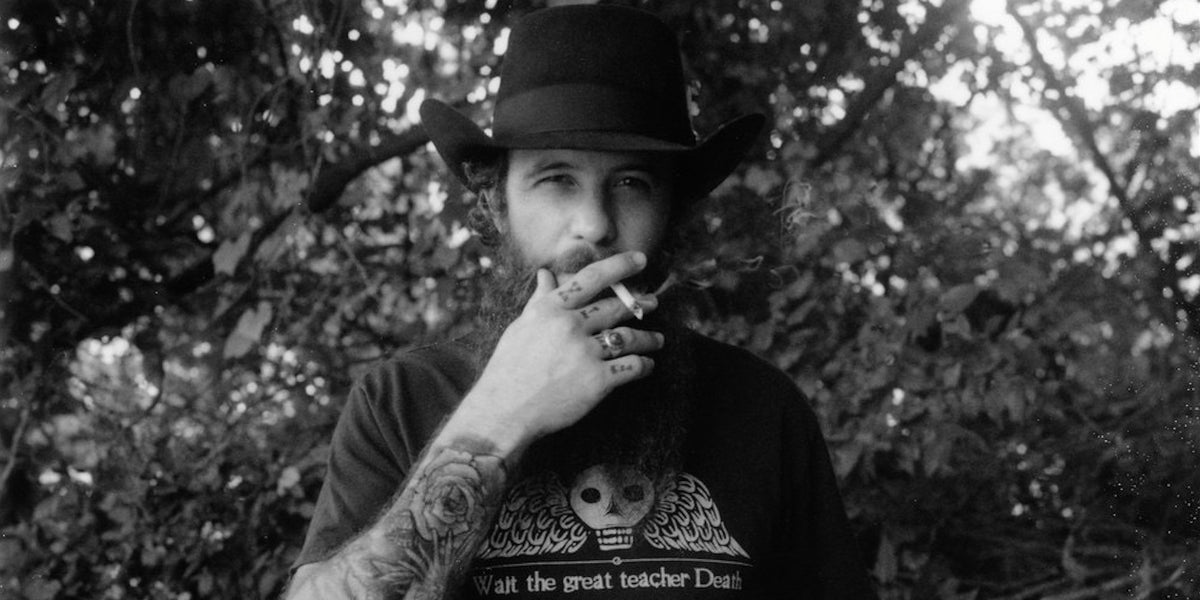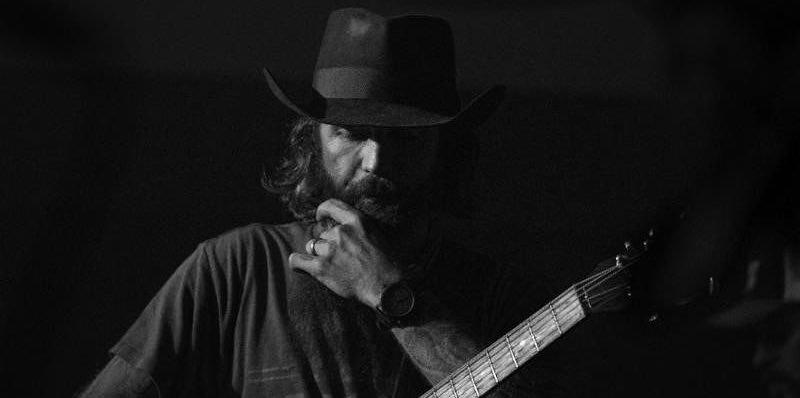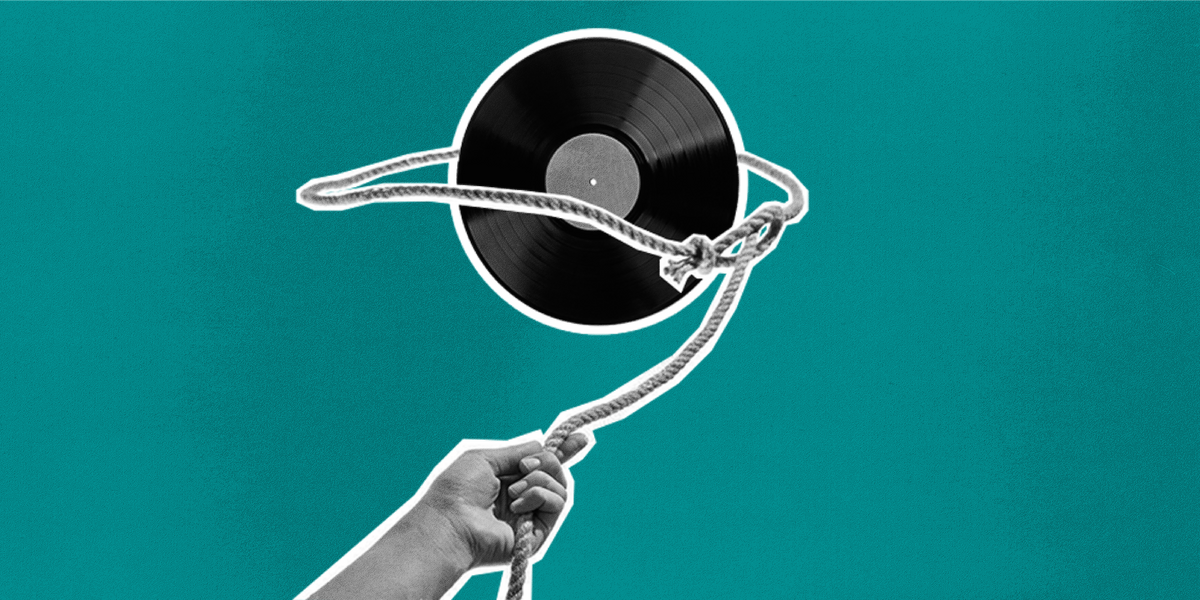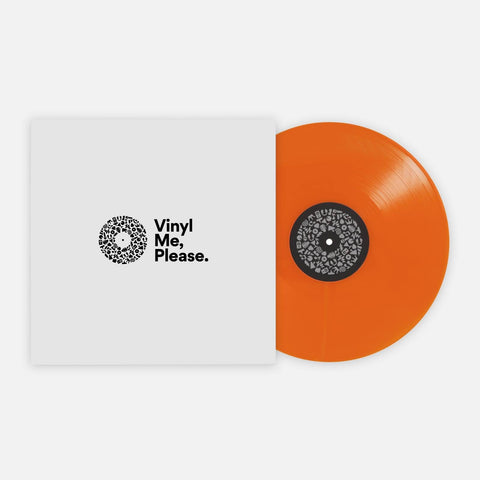Colter Wall’s Plains Songs
An Interview With The Country Singer About His New Album
Colter Wall’s Songs Of The Plains is one of the year’s best albums; raw, open and stunning, it announces the arrival of Wall as a force in folk and country. We’re selling a limited-edition version of the deluxe edition of Songs Of The Plains in our store right now, which you can grab here.
Recently we sent one of our writers to Indianapolis to catch up with Wall. You can read our interview with him about the album, the Internet, and growing up in Saskatchewan below.
It’s an inevitability, so we might as well get it out of the way up top: Colter Wall has a distinct singing voice. It’s maybe even singular, unique to him, none other like it. Comparisons to other artists will always fall short, so all you’re left with is trying to come up with a poetic way to describe it that does its uniqueness some modicum of justice. The closest I think I’ve gotten is that his voice sounds like a mountain eroding, two large boulders grinding and carving each other as they turn to sand. I’m not sure I even like that, and I’m sure Wall wouldn’t either. The point is, the guy has a deep set of pipes, and that voice is the third thing you’ll hear on Songs Of The Plains, after a lightly strummed acoustic guitar and a harmonica.
“People always like to make comparisons with artists, that’s the natural thing that you do as a listener, I think, is go, ‘Oh, that reminds me of this.’ Usually because I sing in a baritone register, a lot of people are very quick to cite Johnny Cash, which I don’t always agree with, and I love Cash, but I don’t feel like there’s really all that much of similarity there,” Wall tells me over a picnic table and a Marlboro cigarette backstage at Indianapolis’ Holler on the Hill Festival. “It’s an honor, obviously, but I’ve gotten that a lot, I get all kinds of weird stuff, like, it’s funny when people say like, ‘You're a combination of so-and-so and so-and-so,’ and they always kind of don’t make sense, but I don’t know. I figure everybody hears it different and they’re always going to decide what it is for themselves.”
Wall’s voice, by sheer magnitude, is the centerpiece of his sophomore album, Songs Of The Plains, out on October 12 via Young Mary’s Record Co./Thirty Tigers. Recorded in a single week at RCA in Nashville with country super producer Dave Cobb (Chris Stapleton, Sturgill Simpson, Jason Isbell), Songs Of The Plains is a modern rendering of classic gunfighter country albums by Marty Robbins and Tex Ritter, the pre-outlaw, pre-countrypolitan era when records were filled with literal outlaws, lawmen, distressed damsels and complicated moral quandaries. While the early ’70s remain left-of-center country’s total lodestar, Songs Of The Plains sounds like it could have come out in 1961 — and thanks to its perfect cover, it looks like it too. The album had been gestating, along with, he says, the next couple Colter Wall albums, in Wall’s mind for awhile; he grew up in Swift Current, Saskatchewan (population 16,000), a place where the grain elevators stand stories above any of the nearest buildings and which had a lot more in common with the American West than any other region.
“In Canada, our cultural divide is sort of split East to West as opposed to North to South, just because of the way that the country is laid out. And somebody from the prairie provinces or someone from Western Canada, it’s kind of our own version of the Western culture; it’s rodeo culture, it’s cattle culture, you know it’s a lot to do with how the CP rail kind of connected that area,” Wall said. “Saskatchewan borders North Dakota and Montana on the west side. So it’s kind of a crossover of our own Canadian culture and that sort of Western influence we have up there. It’s the music that I think of when I think of home. It’s cowboy songs and it’s songs about the West, and, obviously, that entails certain things lyrically and thematically, but also musically. I’m just proud to be from where I’m from and want to tell that story. But this whole record was really kind of just a no-brainer for that reason. I wanted to make a record that’s a collection of songs about where I’m from.”
Wall’s songwriting often takes a backseat to his voice — sorry about that — but he’s already a master at paring his songs down to be sparse lyrically but packed with small details. The highlight of his 2015 debut EP, Imaginary Appalachia — self-released and on his own label until it was reissued last year — was “The Devil Wears A Suit And Tie,” which pauses its meeting-the-Devil-at-the-crossroads story to detail the type of car the Devil was driving (a series 10 Cadillac). On Songs Of The Plains’ “John Beyers (Camaro Song)” — a true story from ’70s Swift Current, allegedly — a man on the way to shoot up the Camaro of his former best friend, who shot up his Camaro first, is briefly thwarted by a train blocking the street before the song just floats off for you to fill in the rest.
Songs Of The Plains opens with “Plain To See Plainsman,” a song Wall wrote during a bout of homesickness — he lives in Nashville now — that is a plaintive, beautiful song which finds him asking, “let me die in the country, that I love the most.” From there, there are covers of Wilf Carter rodeo classics (“Calgary Round Up”), the requisite outlaw hagiography (“Wild Bill Hickok”) and the railroad song (“The Trains Are Gone”), and an especially showstopping, mostly a cappella cattle roundup song (“Night Herding Song”). Songs Of The Plains is an astonishing accomplishment when taken as a whole; it’s a country concept album that feels simultaneously like an intimate love letter to a really small place, and a widescreen epic about a young man trying to make sense of his hometown and his place within and outside it.
“I recognized [from a young age] that Swift Current was a pretty small place and definitely an isolated part of the world,” Wall said. “Saskatchewan has just over one million people that live there and it’s about the size of two states of Texas. It’s a big, vast area, not a very densely populated area. So you definitely kind of feel separated from most of what’s going on in the rest of the world.”
Wall was born in 1995, which makes the owner of that deep voice 23 years old. He didn’t start singing the way he sings until he was about 18 or 19, and recorded Imaginary Appalachia shortly thereafter. It was titled that because he’d barely left Saskatchewan, and the region’s Americana music was the first of many of his musical obsessions (in that way it’s of a piece with Plains; both started in YouTube holes). The EP was a well-kept secret among country and folk fans, until Brock Lesnar — WWE and UFC legend, and Saskatchewan resident — plugged the album in a huge way on the WWE Network during a taping of Stone Cold Steve Austin’s podcast. Wall booked more shows, came to the attention of Mary Sparr at Young Mary’s Record Co. and linked up with Cobb for 2017’s self-titled debut (and our Best Country Album of 2017).
A year later, he’s back with Songs Of The Plains, songs from which he’s already been performing on the road, including at Holler on the Hill last month. Before the show, we talked about how he discovered the music that serves as his inspiration, improving his voice and promoting himself via social media.
VMP: Let’s start back with growing up in Swift Current, which I’m sure you get asked a lot from writers in the U.S. because we don’t know what Saskatchewan is like down here. How small is Swift Current?
Colter Wall: It’s technically, I think they call it a city, but it’s very much a small-town mentality. I couldn’t give you an exact population number but it’s a small community. It’s very closed in. It’s in southwestern Saskatchewan, which is predominantly ranch land and farmland, most of the province is. So it’s just a little valley town in the prairie. There’s a big rail yard there and a pretty good bowling alley and there’s not much else to say.
How did you find out about music living out in the sticks like that? Because you have a pretty big well of music that you’re pulling from as your inspiration. I assume it was the internet, like everybody under 30 at this point.
I mean for the most part. I grew up with a lot of country and Western music just listening to what my folks listened to, it’s what they played on the radio so I’d heard a lot of that stuff from a pretty young age. But then after that, it was mostly, like you said, just doing research on the internet. I’m the kind of person that when I really like something I have to know all the information about it, and that goes for records more than just about anything else. So I’m kind of a music history nerd; I want to know where everything comes from. A lot of my time was spent just grabbing hold of stuff and trying to figure out stuff like that.
I think people don't necessarily think of a younger country artist being on YouTube just like everybody else.
The internet is a strange thing. I always say, there’s really no excuses for not knowing your stuff now because it’s all right at your fingertips. You can learn just about anything in a pretty short period of time.
A lot of the writing about you kind of fixates on your voice. When did you realize you could sing like you sing? Was there a moment when you realized, “I have this lower register?”
Yeah, I mean, I’d been trying to sing for a while and at a certain age, probably around 18 or 19, I tried to sing in a lower register and for the first time it felt natural. But it was never like a right away kind of thing, it’s something I’m still working on. I’m still trying to improve my vocals at every show, you know, get a little better. Because I’ve never been a singer, I’m not a trained vocalist or anything, so it’s always kind of been something that I’m still trying to figure it out. Much like the guitar and everything else, I’m still working at it, trying to get a little better, and I hope that’s evident on the records. When you listen to that first EP and the one last year and this new one, I hope people can hear sort of the progression of my vocals, trying to sing a little better.
Yeah, that was one of my later questions; I feel like you can really chart that you’re getting more confident in what you can do with that voice. The yodeling song on this record is really intense, and I don’t know that I expected that the first time I played it. So that was a conscious thing for you?
Oh, absolutely, yeah. Well, because of the theme of the record and because of the nature of the songs, and also just because I love that stuff, you know. And I constantly, again, am just trying to sing better all the time, the best I can.
That’s the job now at this point, right?
Pretty much. It’s why they pay me the medium bucks, you know.
You did this record with Dave Cobb, too, so what does that week-long process in the studio look like? Were the songs already written?
Oh yeah, they were all done. Going to the studio, we never start work right away over there at RCA, we usually have a couple drinks, hang out, bullshit about whatever and then start. Then he’ll say, “Hey, what song do you want to try today?” And then we try it. Pretty laid back over there. But at the same time, Dave works kind of this weird dichotomy of he’s always laid back but he also has the intensity when he’s working, when he’s producing. But a lot of this album was kind of, I think I’ve stepped into more of a sort of co-producer role with this record just because I had such a strong idea of how I wanted it to sound. But yeah, it’s pretty easy-going over there at RCA, which is cool. It’s cool just to be able to be in that building, for historical reasons and musical reasons.
This record is another one that’s pretty sparse. How thought-out is the instrumentation beyond just your voice and guitar?
Well, you know, it has a lot to do with the theme of the record, too, capturing that sort of emptiness that you get out West and when you’re on the plains, it’s just big — a lot of space. So, some of it’s because of that, and also just because for these songs, it seems to service them best to do them like that. Maybe with some other instrumentation and band stuff going on in the back, but never anything too much. And the next record may be like that, it may not, but at this point it seems like the right thing for what I’m trying to do.
How did you decide which covers to incorporate in? Because I think if you’d listen to this you’d think the songs that are covers are just part of the songs you wrote for this.
There’s a few of them, the Wilf Carter one (“Calgary Round-Up”) was just something that I came across that song one day and it just made sense because he’s singing about the big rodeo we have in Western Canada, which rodeo culture is a huge part of our culture. And then you know the traditionals, I just wanted to have some traditional cowboy songs in there because I sing a lot of those (“Night Herding Song” and “Tying Knots In The Devil’s Tail”). Again, it made sense with the theme.
You’ve gotta be like the only musician on Twitter sharing Marty Robbins songs —
Oh, I’m sure there’s somebody else out there (laughs).
(Laughs)
There better be somebody else out there doing it.
I just think that’s an interesting part of having to promote a record in 2018, is that you’ve gotta get on Twitter. How do you think about your social media?
I don’t know, I don’t really do a lot of social media. Every now and then I’ll post a link to something like that on Twitter, something I think is funny. Usually it’s a link to some oddball song that people might not have heard of, or just an artist that I like that then a lot of people might want to hear. I just love that music so much I figure more people should know about it. I just want to get it out there. But I’ve tried to steer clear of a lot of that social media stuff, because it’s kind of all-consuming, and some people I think just get kind of addicted to it, and it’s not really my deal. But I do like turning people’s ears to old records that to them would be new, and, again, there’s so much out there on the internet as far as just like, crazy old footage from a Marty Robbins TV appearance or something, so it’s really easy to find that stuff and just get it out there into the world.
Colter Wall is on tour now. You can stream Songs of the Plains here, and you can grab it on exclusive vinyl here.
Andrew Winistorfer is Senior Director of Music and Editorial at Vinyl Me, Please, and a writer and editor of their books, 100 Albums You Need in Your Collection and The Best Record Stores in the United States. He’s written Listening Notes for more than 30 VMP releases, co-produced multiple VMP Anthologies, and executive produced the VMP Anthologies The Story of Vanguard, The Story of Willie Nelson, Miles Davis: The Electric Years and The Story of Waylon Jennings. He lives in Saint Paul, Minnesota.
Related Articles
Join the Club!
Join Now, Starting at $36Pages







